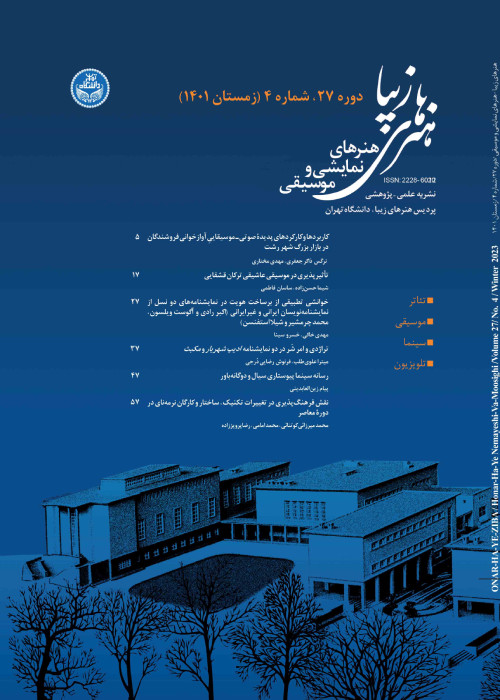Digital Spaces and Tradition of Creating Illusionistic Environments in Western Contemporary Theater Scenography
Author(s):
Abstract:
The word Illusion in most English dictionaries such as Webster, Oxford, Collins, Longman and also Heritage is being defined as: wrong appearance or deceptive perception of reality, false or illusory understanding of reality. In Encyclopaedia Britannica this word means false perception, incorrect idea, misrepresentation of a real sensory stimulus, delusion, deceptive image. By joining this word with the word Environment Illusionistic Environments" is created, referring to a space with a deceptive appearance that can create a false impression of what is really there in the audience. This tradition has continued from ancient Greece and is created in different ways. Thanks to modern technologies, the western contemporary theater scenography has created digital spaces called "soft décors." These spaces can create illusionistic environments and provide new performance possibilities for directors and actors along with "hard décors." Illusionistic environment provides opportunities beyond conventions, symbols and signs through which theater artists try to create a mental picture of reality for the audience using "mental process of spectator". In this environment, the created space can create a deceptive image of reality on its own without the use of mental faculties of spectators. The main objective of this article is to examine the role of digital spaces in creating illusionistic environments in the Western contemporary theater scenography and examine the new performance possibilities achieved in the field of acting and directing. For this purpose, the following questions are considered as the main research questions: A) What is the role of digital spaces in Western contemporary theater scenography in creating illusionistic environments? B) What new performance possibilities in the field of acting and directing at the scene can be provided by digital technology for creating illusionistic environments? After reviewing the databases related to the field of theater, the scientific and valid articles inside and outside of Iran, treatises registered in the Iranian Research Institute for Information Science and Technology, and other databases related to the field of theater, it was observed that some studies solely introduced digital technology and machinism in the theater, and there is no independent article or book with the same goal of the present study. In the process of this research, in addition to explaining the research basics, examinations of the role of digital images, telematics technology and real (not virtual) actor's body as the main elements of illusionistic environments and, on the other hand, the works of recent outstanding scenographers, including "Josef Svoboda" (1920- 2002), "Paul Sermon" (1966- ) and "Marcel·lí Antúnez Roca" (1959-) with the aim of achieving their scenography ratio by creating illusionistic environments are further explored. Using the analytical-descriptive method referring to library resources and images, results indicate that digital technologies not only cause interaction and sharing of space inside and outside of the scene for acting and directing, but also they herald the advent of a new medium that may be able to achieve whatever the theater lacks and the cinema cannot achieve.
Keywords:
Language:
Persian
Published:
Honar-Ha-Ye-Ziba: Honar-Ha-Ye Mosighi Va Namayeshi, Volume:22 Issue: 55, 2017
Pages:
59 to 70
magiran.com/p1662993
دانلود و مطالعه متن این مقاله با یکی از روشهای زیر امکان پذیر است:
اشتراک شخصی
با عضویت و پرداخت آنلاین حق اشتراک یکساله به مبلغ 1,390,000ريال میتوانید 70 عنوان مطلب دانلود کنید!
اشتراک سازمانی
به کتابخانه دانشگاه یا محل کار خود پیشنهاد کنید تا اشتراک سازمانی این پایگاه را برای دسترسی نامحدود همه کاربران به متن مطالب تهیه نمایند!
توجه!
- حق عضویت دریافتی صرف حمایت از نشریات عضو و نگهداری، تکمیل و توسعه مگیران میشود.
- پرداخت حق اشتراک و دانلود مقالات اجازه بازنشر آن در سایر رسانههای چاپی و دیجیتال را به کاربر نمیدهد.
In order to view content subscription is required
Personal subscription
Subscribe magiran.com for 70 € euros via PayPal and download 70 articles during a year.
Organization subscription
Please contact us to subscribe your university or library for unlimited access!


